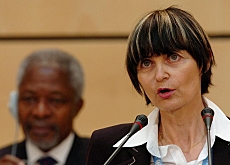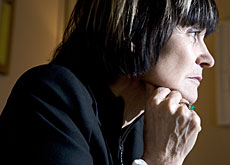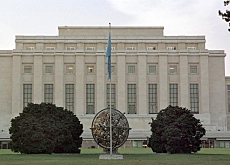Human rights take centre stage in Geneva

Swiss Foreign Minister Micheline Calmy-Rey has hailed the creation of the United Nations Human Rights Council, which is holding its inaugural session in Geneva.
Switzerland, involved in the project from the beginning, said the body would pursue efforts to ensure it is more effective than the highly politicised commission it has replaced.
Calmy-Rey described the challenge facing the council as an “immense task”, adding that the arrival of the new institution reinforced Geneva’s role as the capital of humanitarian efforts and human rights.
“This event gives cause for much hope, but a lot remains to be done to make this council really efficient and effective,” she said. “We have provided a framework […] I believe that with the council we have somewhere to talk and not to confront each other.”
Calmy-Rey promised that Swiss diplomacy would continue to play a role in the project and saw Switzerland as “giving boosts and providing ideas”.
The foreign minister warned that the fight against terrorism must not override fundamental rights. “For Switzerland, any strategy […] must take into account respect of human rights,” she told delegates.
The UN Secretary-General Kofi Annan also addressed the council on Monday, saying it offered the global body a “great new chance” to renew its struggle for human rights.
Annan said the council should avoid the political point scoring of its largely discredited predecessor, the Human Rights Commission. The commission lost credibility because some countries with terrible rights records used their membership to protect one another from condemnation.
“This council represents a great new chance for the United Nations and for humanity to renew the struggle for human rights,” he added. “I implore you, do not let the opportunity be squandered.”
Stronger body
The Office of the UN High Commissioner for Human Rights said the council should “build on the recognised strengths of its predecessor and flesh out the features that make it a stronger and more effective human rights body”.
Fears remain, however, that the council may prove just as toothless as the commission since nations accused of rights violations have managed to keep their seats.
Cuba, Saudi Arabia, China and Russia all won seats despite their poor human rights records, although others – notably Iran – were defeated.
“There are countries on the council that have pretty bad human rights records,” said an Amnesty International spokesman. “But the council has to reflect UN membership. They reflect the reality of the world.”
The Swiss are preparing a document on the new institution’s operating procedures, including how it should carry out human rights reviews of all 191 UN member states and how often.
This is to be discussed at a conference in Lausanne on August 28.
Switzerland will also assume responsibility for part of the expansion of the Office of the UN High Commissioner for Human Rights, whose budget and staff are doubling.
Switzerland plans as well to provide offices for the 35 countries that do not have permanent missions in Geneva. To date, 15 countries have taken advantage of this.
swissinfo with agencies
Switzerland was elected to the Human Rights Council with a three-year mandate on May 9. The vote took place at the UN General Assembly in New York.
The mandate can only be renewed once. Switzerland must then cede its place to another country from the western group, before being able to stand for election again.
On Monday, Swiss ambassador Blaise Godet was chosen as the vice-president representing the seven-nation western group.
At the second session in September, Switzerland will present a universal index of human rights containing more than 1,000 documents on how to run the new body.
The Human Rights Council is sitting for the first time in Geneva from June 19-30.
The council will meet at least three times a year for no less than ten weeks, and can convene emergency sessions. Its predecessor, the Human Rights Commission, met for just an annual six-week session.
Much of the initial two-week session of the 47-state body will be devoted to planning future work, but its chairman, ambassador Luis Alfonso de Alba of Mexico, has set aside time for examining current rights crises around the world.

In compliance with the JTI standards
More: SWI swissinfo.ch certified by the Journalism Trust Initiative










You can find an overview of ongoing debates with our journalists here . Please join us!
If you want to start a conversation about a topic raised in this article or want to report factual errors, email us at english@swissinfo.ch.